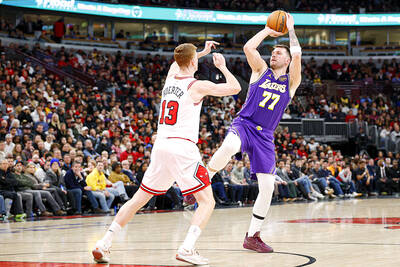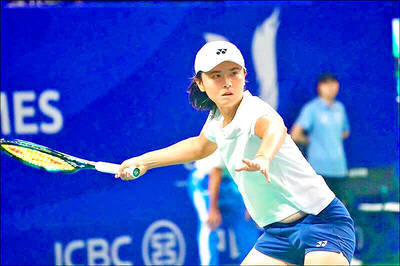As gigabytes of data flow from field to fingertips, the technological divide has been closing between teams at the World Cup.
While the focus has been on the debut of video assistant referees, less obvious technical advances have been at work and the coaches have control over this area, at least.
No longer are the flashiest gizmos to trace player movements and gather data the preserve of the best-resourced nations. All World Cup finalists have had an array of electronic performance and tracking systems made available to them by FIFA.
“We pay great attention to these tools,” Poland coach Adam Nawalka said. “Statistics play an important role for us. We analyze our strength and weaknesses.”
The enhanced tech at the teams’ disposal came after FIFA approved the use of hand-held electronic and communications equipment in the technical area for tactical and coaching purposes.
That allows live conversations between the coaches on the bench and analysts in the stands, a change from the 2014 World Cup, when the information gathered from player and ball-tracking systems could not be transmitted in real time from the tribune.
“It’s the first time that they can communicate during the match,” FIFA head of technology Johannes Holzmueller said. “We provide the basic and most important metrics to the teams to be analyzed at the analysis desk.”
The key performance indicators fed by tracking cameras and satellites provide another perspective when coaches make judgements on substitutions or tactical switches if gaps exposed on the field are identified.
“These tools are very practical, they give us analysis, it’s very positive,” Colombia coach Jose Pekerman said. “They complement the tools we already have.”
Player welfare can also be enhanced with tools to assess injuries in real time allowed for use by medics at this World Cup. Footage of incidents can be evaluated to supplement any on-field diagnosis.
A second medic “can review very clearly, very concretely what happened on the field, what the doctor sitting on the bench perhaps could not see,” FIFA medical committee chairman Michel D’Hooghe said.
However, the technology is moving too quickly for some coaches.
“Football is evolving and these tools help us on the tactical and physiological side,” Senegal coach Aliou Cisse said. “We do look at it with my staff, but it doesn’t really have an impact on my decisionmaking.”
Panama coach Hernan Dario Gomez has reviewed the data feeds, but the team have been eliminated in the group stage after facing superior opponents.
“This is obviously very important information, but not more important than the actual players,” Gomez said.
The data is still reliant the quality of analysts interpreting it.
“You can have millions of data points, but what are you doing with it?” Holzmueller said. “At the end even if you’re not such a rich country you could have a very, very clever good guy who is the analyst who could get probably more out of it than a country of 20 analysts.”
FIFA’s technical staff will continue to innovate, but artificial intelligence is not taking over. For some time, at least.
“People think now it’s all driven by computers,” Holzmueller said. “We don’t want that at FIFA.”

Luka Doncic on Monday produced a 46-point masterpiece as the Los Angeles Lakers snapped the Chicago Bulls’ four-game winning streak with a 129-118 victory on the road. Doncic rattled in eight three-pointers on 15-of-25 shooting from the field, finishing with seven rebounds and 11 assists to lead an impressive Lakers effort at the United Center. LeBron James chipped in with 24 points, five rebounds and three assists, while Rui Hachimura delivered an eye-catching cameo off the bench with 23 points from nine-of-11 shooting. The win was another encouraging result for the Lakers after a 116-110 defeat of the Dallas Mavericks on Saturday. “We did

The Milwaukee Bucks’ Giannis Antetokounmpo on Friday said that he will probably be out for an extended period after hurting his right calf again after a similar injury caused him to miss eight games earlier this season. Antetokounmpo had his right calf wrapped in the first half of their 102-100 loss to the Denver Nuggets. He did not appear comfortable the rest of the night and left for good with 34 seconds remaining. “At the end, I could not move no more, so I had to stop playing,” Antetokounmpo said. The two-time NBA Most Valuable Player said he expected to undergo an MRI

Toronto Maple Leafs captain Auston Matthews is confident in the US men’s ice hockey team and its chances of capturing a gold medal at next month’s Milan Cortina Winter Olympics. The 28-year-old center is among the NHL stars who return to the Olympics for the first time since Sochi, Russia, in 2014 as part of a men’s lineup seeking the first US gold since 1980’s Lake Placid “Miracle on Ice” triumph. “We feel like we’re up there and we should be competing for gold,” Matthews said after practice on Monday in comments on the NHL Web site. “It’s obviously the first Olympics

LICENSE TO THRILL: Fans of Learner Tien, the youngest man to reach the quarter-finals in 11 years, wore ‘L Plates,’ signs for learning drivers, in support of the 20-year-old Taiwan’s Wu Fang-hsien and Japanese partner Eri Hozumi yesterday dominated eighth seeds Ellen Perez of Australia and the Netherlands’ Demi Schuurs to advance to the Australian Open quarter-finals, the furthest the Taiwanese has made it since her first appearance in Melbourne in 2020. Wu and Hozumi overpowered world No. 21 Perez and world No. 20 Schuurs 6-2, 6-2 in 1 hour, 11 minutes at 1573 Arena in much cooled temperatures since Saturday’s blazing 40°C disrupted play. World No. 34 Wu has now made it further in the Australian Open since she was knocked out in the third round in 2024. The Taiwanese-Japanese duo